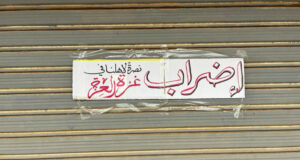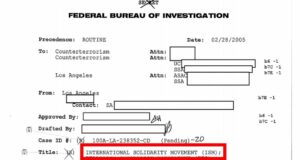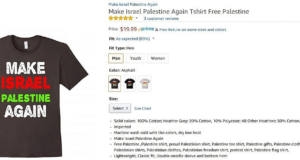By: Ben White
October 19, 2007
We’ve had Live 8 and Live Earth, and this week, albeit on a smaller scale, we almost had One Million Voices. Organised by the OneVoice group, the declared aim was to bring together Palestinians and Israelis in simultaneous events in Tel Aviv, Jericho, London, Washington and Ottawa to voice support for the “moderates” and call for a negotiated two-state solution.
The plans fell through, amid bitter claim and counter-claim, as artists lined up for the Jericho event cancelled, and the Tel Aviv concert followed suit. This followed grassroots pressure by Palestinians who objected to what they see as yet another attempt to promote a false peace that fails to address the structural injustices driving the conflict.
Indeed, despite the peace rhetoric – and the claim that they represent a unique popular call – OneVoice’s approach suffers from the same flaws that have bedevilled official “peace” efforts from Oslo to the Quartet. Such errors were amply demonstrated in Seth Freedman’s column, which implied that the main obstacle to peace is the “extremism” that exists on both sides.
This interpretation of the situation in Palestine/Israel is only possible through a heavy airbrushing of history and a fundamental misreading of the present. Strikingly, the Tel Aviv concert was scheduled to take place in Hayarkon Park – the same location where, almost 60 years ago, the Palestinian village of Jarisha was wiped off the map by Jewish armed forces.
Its residents shared the same fate as almost 800,000 other Palestinians, expelled from what became Israel and prevented to this day from returning home, their land confiscated. Yet official OneVoice material gives the impression that the conflict only began 40 years ago, when Israel occupied the rest of Palestine (the West Bank, Gaza Strip and East Jerusalem).
Condemning the “extremist minority” of both sides sounds laudable. Of course, “both sides” use violence, and of course, there is hatred and religious extremism among both Palestinians and Israelis. The crucial point, however, is that Israel has all the power. Israel is occupying and colonising Palestinian land, not the other way round. Palestinian cities are besieged by a modern, hi-tech Israeli army and subjected to closure, raids and bombardment – not the other way round.
Zionist colonisation is not the preserve of a fanatical fringe in Israel – it is fundamental to the state’s identity and practice. As Martin Luther King said: “Freedom is never voluntarily given by the oppressor; it must be demanded by the oppressed.” Since Israel continues to show no intention of relinquishing its role as colonial overlord, it’s no good to condemn “both sides”, as if there is equality between occupier and occupied.
Unsurprisingly, those with intimate firsthand experience of this apartheid are under no illusions about the usefulness of toothless “peace processes”. Earlier this week, the UN human rights envoy for the Occupied Palestinian Territories, John Dugard, condemned the Quartet for failing to safeguard Palestinian rights. The BBC’s Tim Franks noted that many diplomats and officials based in the region “would agree with Mr Dugard’s political analysis” yet refrain from agreeing publicly.
The language of moderation is all the rage, from OneVoice to Condoleezza Rice, from the aborted peace concerts to the forthcoming November peace conference. It’s a seductive dichotomy; on the one side are those who light the flame of peace, who strive for a “mass awakening” to the “forces of light and friendship and love”. On the other side are the extremists who threaten, smear and mislead; they are wickedly intransigent – they stifle, snuff out hope and burn flags.
But what is a “moderate”? In recent times, “moderate” has been applied to some rather unlikely characters in the Middle East. For the US, UK and Israeli governments, these include states like Saudi Arabia, Egypt and Jordan. None of these permit much genuine freedom of expression; all of them oppress opposition movements. In fact, Saudi Arabia is one of the world’s most repressive regimes.
It seems “moderation” has nothing to do with whether you refrain from the torture of political activists or the flogging of “deviants”, and everything to do with your obedience to US policies and Israeli interests. That is what unites the Saudi royals, the Egyptian president and the Jordanian king.
Meanwhile, groups like ISM, and Another Voice are condemned by Freedman and OneVoice as “extremists” out to ” eradicate the other side”, and accused of making unnamed and unspecified threats. Yet these groups are committed to the defence of human rights and international law, and are made up of tireless Israelis, Palestinians and internationals. Their categorisation as “extremists” then, is actually a reflection of their refusal to accept sugar-coated apartheid or well-meaning platitudes that serve the status quo.
It may be an uncomfortable truth, but peace for both peoples comes no closer if the fundamental power disparity between Israel and the stateless, occupied and dispossessed Palestinians is obscured. Confronting the vested interests that perpetuate Palestine’s conquest may not win you awards from Jordanian monarchs or praise from the US state department; but it ultimately brings you a lot closer to peace.
For the original article and to make comments click here:
http://commentisfree.guardian.co.uk/ben_white/2007/10/the_moderate_blindfold.html
 International Solidarity Movement Nonviolence. Justice. Freedom.
International Solidarity Movement Nonviolence. Justice. Freedom.


